- Tell Me When/Baby Jane (Decca F 11833) 1964 (7)
- Like Dreamers Do/(Boom, Boom, Boom, Boom) Everybody Fall Down (Decca F 11916) 1964 (20)
- Three Little Words/You're The One (Decca F 11981) 1964 (23)
- Chim Chim Chiree/It's Not A Game Anymore (Decca F 12050) 1965 (cancelled)
- It's Not A Game Anymore/Bye Bye Girl (Decca F 12106) 1965
- I Go To Sleep/Make Up Or Break Up (Decca F 12216) 1965
- I'm Through/We Gotta Get Together (Decca F 12301) 1965
- You've Been Cheating/Love Was In My Eyes (CBS 202615) 1967
- The Applejacks (Decca LK 4635) 1964
- The Applejacks - Tell Me When (Deram 820 968-2) 1990
- The Applejacks (Cherry Red Records CDMRED411) 2009 re-release with bonus tracks
The Applejacks
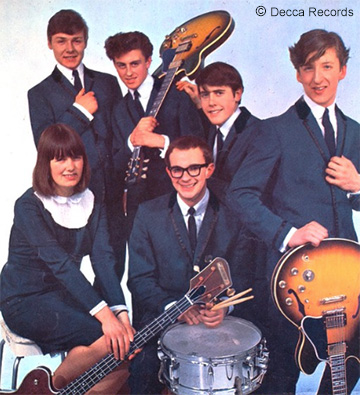
SOLIHULL - BIRMINGHAM
Updated October, 2022
Al Jackson lead vocal (left 1966)
Martin Baggott lead guitar/vocal
Phil Cash rhythm guitar/vocal
Megan Davies bass guitar/vocal
Gerald Freeman drums (left 1967)
Don Gould piano & organ/vocal
John Washington lead vocal (joined 1966)
Paul Willetts drums (joined 1967)
The Applejacks are highly significant in West Midlands music history as the first Birmingham or 'Brum Beat' group to have a top ten hit record. They should not be confused with the late 1950s American recording group of the same name. Despite a promising debut and having a strong Beatles connection, The Applejacks moment in the spotlight was over much too soon.
"Tell Me When"
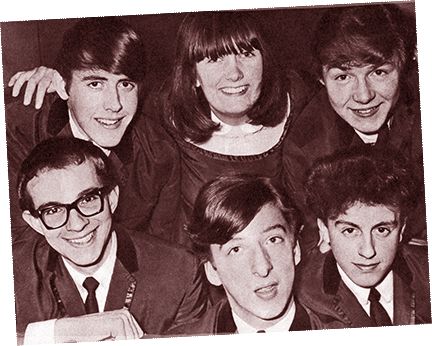
This group, formed in Solihull in 1961, were originally known as "The Crestas" and then "The Jaguars". At that time the line-up consisted of guitarist Phil Cash (born October 9, 1947), guitarist Martin Baggot (born October 20, 1947), drummer Gerald Freeman (born May 24, 1947) and bass guitarist Megan Davies (born March 25, 1944); all members of the 1st Olton Scouts Troop. By the end of 1961, keyboarder Don Gould (born March 23, 1947) was also added to the line-up.
Megan Davies remembered; "At the age of fifteen, I moved from Girl Guides to assist with Wolf Cubs. In 1960, the 1st Olton Scout Group were preparing a 'Gang Show' and when asked Can anyone play an instrument? a few of us took up the challenge. Martin Baggott, Phil Cash and I possessed guitars and Gerry Freeman was the obvious choice as the drummer because he was lead drummer in the Scout band. We all got together to perform a couple of skiffle numbers; 'Hang Down Your Head Tom Dooley' and 'John Henry'. Thus from a little wooden scout hut in Jubilee Park, Olton, Solihull emerged the 'core' of The Applejacks."
Upon later graduating to electric instruments, a bass guitarist was now considered essential. Megan recalled; "Cliff and The Shadows was definitely the way to go. It was obvious then, that one of us would have to change to bass guitar. "Well, you're the worst guitarist Megan. You can play bass!" I'm not sure that it was actually said in so many words, but that's the gist of how I got the job."
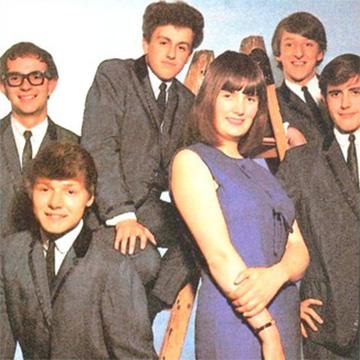
As they had no singer, the band played instrumental songs by groups like "The Shadows" and "The Tornados". Things changed when vocalist Al Jackson (Harry Llewellyn - born April 21, 1945) joined in 1962 and The Applejacks soon became a popular attraction with a regular residency at Solihull Civic Hall.
They played a lot of American style rock 'n' roll; Little Richard, Chuck Berry, Ray Charles etc. and were unusual for the time in having a female bass guitarist (Megan Davies). Megan said; "All the bands were copying American groups and individuals. We loved Ray Charles, Fats Domino, The Coasters, Chuck Berry etc."
The group projected a uniform image even in those early days. Megan Davies recalled; "Maybe it was The Shadows influence or our scouting background that seemed to make us think uniformly. The boys wore red ties to match their guitars and I had a sort of rosette of red ribbon. We thought we looked special but now I look back upon those decisions with extreme embarrassment!"
The Applejacks caught the first wave of the "beat boom" when they were signed up by talent scouts from the prestigious Decca Records company in late 1963. From that point on, things were to move fast for the young group.
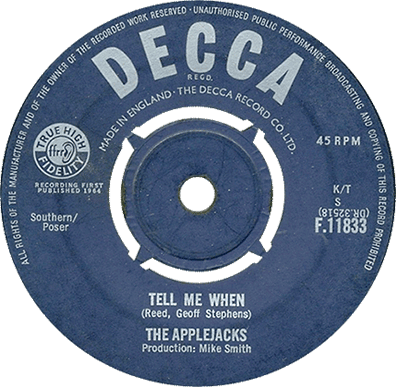
In February of 1964, The Applejacks had their first record released on a single. 'Tell Me When' was composed by songwriters Les Reed and former school teacher Geoff Stephens. Geoff would later compose the hit 'Daddy Don't You Walk So Fast' for Brummie music star Daniel Boone (Peter Lee Stirling). Megan Davies remembers the recording session;
"We met Geoff and Les and were given a copy of their demo. The session was a Decca's studios, just off West End Lane. Mike Leander and Mike Smith were assigned to us by Decca. Mike was responsible for the piano intro on Tell Me When."
The record was a brilliant and catchy composition - fitting the times perfectly. Produced by Mike Smith, it peaked at Number 7 in the U.K. and remained in the charts for 13 weeks. Some of the band members were still going to school at the time!
The beat group scene back then was very much "male dominated" so perhaps the novelty of having a female band member may have helped The Applejacks gain some attention. Another group called "The Honeycombs" from London were perhaps the only other to have chart success at this time with their hit single 'Have I The Right' while having girl drummer Honey Lantree, but The Applejacks beat them to the charts by a few months.
"Like Dreamers Do"
The success of Tell Me When made The Applejacks 'pop stars' almost overnight and brought them national TV appearances on shows like "Ready Steady Go!" and "Thank Your Lucky Stars". It was there where the group made friends with The Beatles who they met during a rehearsal.
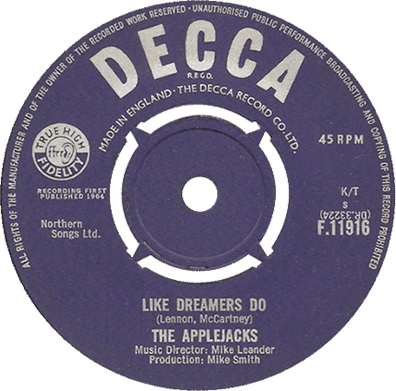
Al Jackson remembers Paul McCartney asking them if they had a follow-up record to Tell Me When to which Al replied "No". Paul said; "Would you like one then?" John Lennon and Paul McCartney provided the Applejacks with a previously un-published Beatles song titled 'Like Dreamers Do' (one of the earliest Lennon/McCartney compositions). Hardly believing their luck, The Applejacks gratefully recorded the song with it being issued as the A-side of their follow-up single.
The Applejacks provided an excellent interpretation of the song and to their credit, developed their own arrangement rather than just 'copying' the Beatles demo. Hopes were high as recordings of Beatles compositions by other artists usually provided a hit record but despite this, the Applejacks version of Like Dreamers Do was to climb only as far as Number 20 in the U.K. record charts.
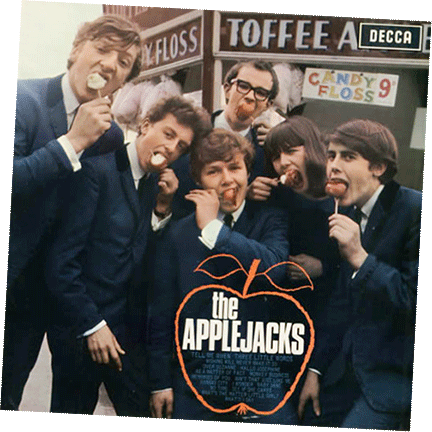
Nonetheless, 1964 proved to be a very busy year for The Applejacks. The group appeared in the British pop music film "Just For You" which also featured 'Freddie and The Dreamers' and 'Peter and Gordon'.
In addition to regular TV appearances, The Applejacks performed live on the coveted 'New Musical Express' annual poll winners concert at Wembley. Perhaps even more memorable was when Megan Davies and drummer Gerry Freeman were married in a highly publicized wedding that was attended by hundreds of screaming local teenagers!
The Applejacks recorded an album for Decca Records under direction of the young Mike Leander who would go on to become a legendary and much-respected successful songwriter and producer. This self-titled album had a simple yet refreshing production style which suited the group well but unfortunately did not sell quite enough copies to make an impact on the national album charts.
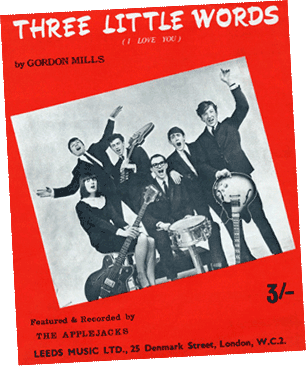
A new Applejacks 45 was released by Decca in October 1964 but the awkward 'Three Little Words' composed by hit songwriter Gordon Mills stalled at Number 23 and was to be their last showing in the record charts. Decca bizarrely wanted the group to record a version of the song 'Chim Chim Chiree' from the popular "Mary Poppins" Disney movie. Although scheduled for release as a single, it was never issued. Megan Davies said; "We refused. It was not recorded by us as far as I recall."
Other singles were recorded by The Applejacks in 1965 but even a very good version of 'I Go To Sleep' (composed by Ray Davies of "The Kinks") could not reverse the group's chart decline. The final Applejacks single issued by Decca was the prophetically titled 'I'm Through' after which the record company decided not to renew their contract.
"We became pretty much isolated as pop artists"
By 1966, The Applejacks had accepted a lucrative contract as cabaret performers on board the luxury Trans-Atlantic ocean liners R.M.S. Queen Mary and Queen Elizabeth I and II. Although a good move for the band financially, chartwise it may have proved to be their undoing. The Cunard engagements isolated them from their fans and made the promotion of any new records by the group all but impossible.
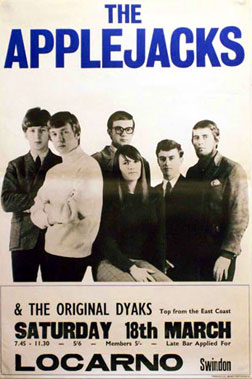
Megan Davies recalled; "The downside to this is that we became pretty much isolated as pop artists and out of touch with the local and national music scene. Nevertheless, those three years at sea were great fun."
Changes in the group's line-up was also to become a problem. Lead vocalist Al Jackson left and was replaced by John Washington who had played in an early line-up of The Fortunes. Don Gould left in 1967 for a successful career in music production and drummer Gerry Freeman also left to become an in-demand session drummer. He was replaced by Paul Willetts.
After being dropped by Decca, The Applejacks switched to CBS Records for their final single release titled 'You've Been Cheatin' that was a cover of a soul song by The Impressions. Martin Baggott was the next to leave and he later emigrated to California after giving up his music career.
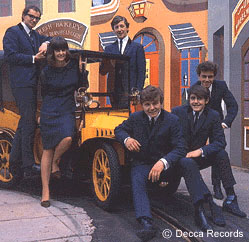
Megan Davies joined a Brum group called Mongrel - the same band that provided members for Roy Wood's chart-topping "Wizzard" after he left the Electric Light Orchestra (see The Move). Megan later gave up music full-time to train as a radiologist after which she worked for many years at The National Hospital for Neurology and Neurosurgery in London where she no doubt helped save many lives, surely a most worthy career for a former pop star.
In this way, The Applejacks faded from the scene, but their place in BrumBeat history is assured as they were the first local group to make a big impact on the national record charts and thus open the door for many other talented groups and performers from the West Midlands.
A historic event occurred in Birmingham on December 11, 2010 when for the first time in more than 40 years, the original line-up of The Applejacks re-formed for a charity concert. The occasion was recorded for a DVD which can now be ordered on-line at nominal cost. To buy a copy, visit Tony Sheppard's web site at www.splinters-the-novel.com/buy-now/the-applejacks-reunion-concert-dvd-2010.
Copyright © John R Woodhouse
The Applejacks 1960's Record Releases
(highest UK chart position in brackets)
Singles:
Album:
Compact Disc:
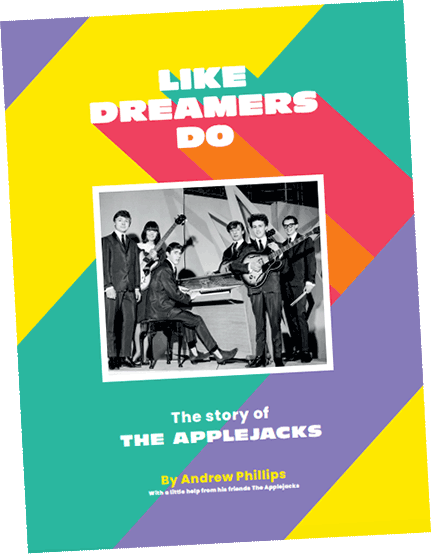
NEW Applejacks Book!
LIKE DREAMERS DO - THE STORY OF THE APPLEJACKS
The first and only book dedicated to The Applejacks is now written by author Andrew Phillips. To see the BrumBeat book review exclusive to the BrumBeat web site click HERE.
To order a copy, follow this link for detailswww.theapplejacks.co.uk
To see a recent interview of Megan Davies exclusive to BrumBeat.net click HERE
If you would like to contribute to this page, please e-mail john@brumbeat.net